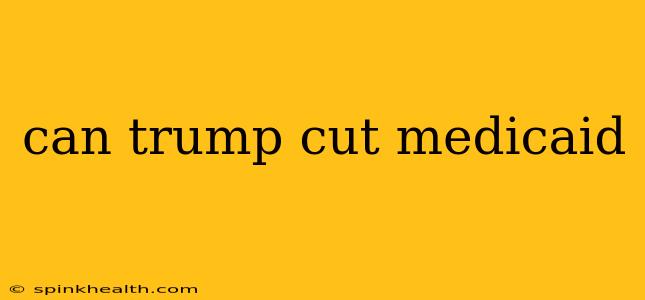Can Trump Cut Medicaid? Understanding the Complexities of Healthcare Reform
The question of whether a president can cut Medicaid is far more nuanced than a simple yes or no. While a president doesn't have the unilateral power to simply eliminate the program, they wield significant influence over its funding and scope through various legislative and executive actions. Let's unravel this complex issue, exploring the historical context, legal frameworks, and political realities involved.
My name is Amelia Hernandez, and I've spent years researching healthcare policy in the United States. My background in political science and economics provides a foundation for understanding the intricate interplay between presidential power and social programs like Medicaid.
The History of Medicaid and Presidential Influence:
Medicaid, established in 1965 as part of President Lyndon B. Johnson's "Great Society" programs, is a joint federal and state government program providing healthcare coverage to millions of low-income Americans. Since its inception, the program has faced continuous debates regarding funding levels, eligibility criteria, and the balance of power between the federal and state governments. Each president has, in their own way, influenced the direction and trajectory of the program.
Some presidents have sought to expand Medicaid coverage, while others have championed efforts to control costs and reform the system. These actions have taken many forms, from proposing legislative changes to Congress, to implementing executive orders impacting program administration and regulations. The extent to which a president succeeds in shaping Medicaid policy depends on several factors, including the political climate, the composition of Congress, and public opinion.
Can a President Cut Medicaid Funding Directly?
No, a president cannot unilaterally cut Medicaid funding. Medicaid is a congressionally authorized program, meaning its funding and structure are dictated by laws passed by Congress. While a president can propose budget cuts to Congress, the final decision rests with the legislative branch. Congress holds the power of the purse, and any significant changes to Medicaid funding require legislative approval.
How Could a President Indirectly Impact Medicaid?
Even without direct control over funding, a president can still significantly affect Medicaid in several ways:
1. Through Budget Proposals: A president's annual budget proposal sets the tone for spending discussions in Congress. By proposing significant cuts to Medicaid, a president can exert pressure on lawmakers to consider reductions. However, Congress is not obligated to follow the president's recommendations.
2. Executive Orders and Regulatory Changes: A president can use executive orders to modify regulations governing Medicaid administration, impacting eligibility requirements, reimbursement rates for providers, or the types of services covered. These actions can indirectly affect the program's costs and accessibility.
3. Appointment of Key Officials: Presidents have the power to appoint officials to key positions within agencies responsible for administering Medicaid, such as the Centers for Medicare & Medicaid Services (CMS). These appointments influence the agency's priorities and policies, which can impact the implementation of the program.
4. Political Pressure and Public Discourse: A president's public statements and political strategies can shape public opinion and influence legislative decisions regarding Medicaid. By framing the debate around particular issues (like cost containment or program efficiency), a president can indirectly influence the outcome of legislative discussions.
What are the Potential Consequences of Medicaid Cuts?
Potential consequences of Medicaid cuts are far-reaching and varied, including:
- Reduced access to healthcare: Millions of low-income Americans rely on Medicaid for essential healthcare services. Cuts could lead to reduced access to care, resulting in delayed or forgone treatment, worsening health outcomes, and increased mortality rates.
- Increased financial burden on individuals and states: Reduced federal funding could shift a greater share of costs onto states and individuals, potentially straining state budgets and leaving vulnerable populations with higher out-of-pocket expenses.
- Impact on healthcare providers: Decreased Medicaid reimbursement rates could force healthcare providers to reduce services or close their doors altogether, particularly in underserved communities.
Conclusion:
The question of whether a president can cut Medicaid is complex. While a president lacks the power to unilaterally eliminate the program, their influence on its funding, administration, and overall direction is considerable. Understanding the interplay between the executive and legislative branches, alongside the potential repercussions of any changes to this crucial social program, is crucial to engaging in informed discussions about healthcare policy in the United States.

